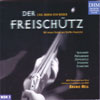Weber Der Freischütz
‘Authentic’ Freischütz, but shorn of its spoken dialogue with devastating results
View record and artist detailsRecord and Artist Details
Composer or Director: Carl Maria von Weber
Genre:
Opera
Label: Deutsche Harmonia Mundi
Magazine Review Date: 12/2002
Media Format: CD or Download
Media Runtime: 120
Mastering:
Stereo
DDD
Catalogue Number: 05472 77536-2

Tracks:
| Composition | Artist Credit |
|---|---|
| (Der) Freischütz |
Carl Maria von Weber, Composer
Andrea Weigt, Fourth Bridesmaid, Soprano Andreas Hörl, Hermit, Bass Anke Lambertz, Second Bridesmaid, Soprano Bruno Weil, Conductor Cappella Coloniensis Carl Maria von Weber, Composer Christian Gerhaher, Ottokar, Baritone Christian Gerhaher, Kilian, Baritone Christiane Rost, Third Bridesmaid, Soprano Christoph Prégardien, Max, Tenor Friedemann Röhlig, Cuno, Bass Gabriele Henkel, First Bridesmaid, Soprano George Zeppenfeld, Caspar, Bass Johanna Stojkovic, Aennchen, Soprano Markus John, Samiel, Speaker Petra Maria Schnitzer, Agathe, Soprano West German Radio Chorus |
Author: Michael Oliver
The conductor of this recording, Bruno Weil, feels that the spoken dialogue in Der Freischütz is weak, and he has accordingly replaced it with a commentary delivered by Samiel, the Black Huntsman himself. The author of the commentary, Steffen Kopetzky, does not share Weil’s view of Friedrich Kind’s text (‘not as bad as it is made out to be…his approach is dramatically perfect’) and neither, of course, did Weber. Since Kopetzky’s contribution is not a narration, more a quasi-philosophical interrupted monologue (‘He who lives between all lives nowhere. He must constantly turn round, must see where he has room for this turning around his own axis’, whatever all that may mean), the plot is obscured.
All stage directions are excised from the printed libretto, so it is by no means clear who, for example, Kaspar is addressing when he begins his aria ‘Silence, silence, so that no one notices you’ (his drinking song has already been robbed of menace and meaning by the absence of the dialogue preceding and punctuating it). The climactic exchanges before the Act 3 finale are replaced by a windy soliloquy from Samiel. No wonder that the performance seems so half-hearted: another function of those dialogues is to provide motivation for the sung numbers that follow them; one cannot blame Christoph Prégardien for singing ‘Durch die Wälder’ lyrically but with little sense of Max’s predicament at that point.
Most of the singers are affected to some degree by this conversion of Der Freischütz into an oratorio: both Agathe’s arias are given modest, small-scale readings (Petra Maria Schnitzer’s voice is pretty, but not large); Aennchen has some charm though not much character, but in her first arietta she is not helped by Weil’s slightly heavy hand, nor in her second by a hoarse viola obbligato. The orchestra is of period instruments, and I am grateful for the restoration of the all-important natural horn sonorities and for the absence of late-Romantic rhetoric. But not for much else: I had not thought that the Wolf’s Glen scene could be so woefully tame (the casual, almost conversational evocation of Samiel doesn’t help), and elsewhere alongside orchestral textures that often remind you that Weber shared far more of his lifetime with Haydn than with Wagner, too many pages are slack, heavy or under-characterised. None of those adjectives is authentic to Weber.
All stage directions are excised from the printed libretto, so it is by no means clear who, for example, Kaspar is addressing when he begins his aria ‘Silence, silence, so that no one notices you’ (his drinking song has already been robbed of menace and meaning by the absence of the dialogue preceding and punctuating it). The climactic exchanges before the Act 3 finale are replaced by a windy soliloquy from Samiel. No wonder that the performance seems so half-hearted: another function of those dialogues is to provide motivation for the sung numbers that follow them; one cannot blame Christoph Prégardien for singing ‘Durch die Wälder’ lyrically but with little sense of Max’s predicament at that point.
Most of the singers are affected to some degree by this conversion of Der Freischütz into an oratorio: both Agathe’s arias are given modest, small-scale readings (Petra Maria Schnitzer’s voice is pretty, but not large); Aennchen has some charm though not much character, but in her first arietta she is not helped by Weil’s slightly heavy hand, nor in her second by a hoarse viola obbligato. The orchestra is of period instruments, and I am grateful for the restoration of the all-important natural horn sonorities and for the absence of late-Romantic rhetoric. But not for much else: I had not thought that the Wolf’s Glen scene could be so woefully tame (the casual, almost conversational evocation of Samiel doesn’t help), and elsewhere alongside orchestral textures that often remind you that Weber shared far more of his lifetime with Haydn than with Wagner, too many pages are slack, heavy or under-characterised. None of those adjectives is authentic to Weber.
Discover the world's largest classical music catalogue with Presto Music.

Gramophone Digital Club
- Digital Edition
- Digital Archive
- Reviews Database
- Full website access
From £8.75 / month
Subscribe
Gramophone Full Club
- Print Edition
- Digital Edition
- Digital Archive
- Reviews Database
- Full website access
From £11.00 / month
Subscribe
If you are a library, university or other organisation that would be interested in an institutional subscription to Gramophone please click here for further information.




